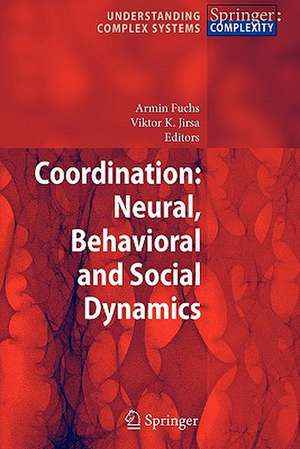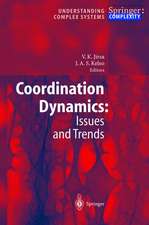Coordination: Neural, Behavioral and Social Dynamics: Understanding Complex Systems
Editat de Armin Fuchs, Viktor K. Jirsaen Limba Engleză Paperback – 11 noi 2010
The chapters in this volume are not simply write-ups of the lectures given by the experts at the meeting but are written in a way that they give sufficient introductory information to be comprehensible and useful for all interested scientists and students.
| Toate formatele și edițiile | Preț | Express |
|---|---|---|
| Paperback (1) | 567.32 lei 38-44 zile | |
| Springer Berlin, Heidelberg – 11 noi 2010 | 567.32 lei 38-44 zile | |
| Hardback (1) | 648.42 lei 6-8 săpt. | |
| Springer Berlin, Heidelberg – 3 ian 2008 | 648.42 lei 6-8 săpt. |
Din seria Understanding Complex Systems
- 18%
 Preț: 1112.30 lei
Preț: 1112.30 lei -
 Preț: 439.25 lei
Preț: 439.25 lei - 18%
 Preț: 1119.38 lei
Preț: 1119.38 lei - 15%
 Preț: 401.82 lei
Preț: 401.82 lei - 18%
 Preț: 1247.26 lei
Preț: 1247.26 lei - 15%
 Preț: 641.20 lei
Preț: 641.20 lei - 15%
 Preț: 642.68 lei
Preț: 642.68 lei - 15%
 Preț: 651.51 lei
Preț: 651.51 lei - 18%
 Preț: 946.55 lei
Preț: 946.55 lei - 18%
 Preț: 947.98 lei
Preț: 947.98 lei - 20%
 Preț: 650.27 lei
Preț: 650.27 lei - 18%
 Preț: 952.09 lei
Preț: 952.09 lei - 18%
 Preț: 957.13 lei
Preț: 957.13 lei - 18%
 Preț: 943.88 lei
Preț: 943.88 lei -
 Preț: 398.35 lei
Preț: 398.35 lei - 5%
 Preț: 1417.54 lei
Preț: 1417.54 lei - 15%
 Preț: 648.42 lei
Preț: 648.42 lei -
 Preț: 387.75 lei
Preț: 387.75 lei - 18%
 Preț: 1133.76 lei
Preț: 1133.76 lei - 18%
 Preț: 948.16 lei
Preț: 948.16 lei - 20%
 Preț: 655.85 lei
Preț: 655.85 lei - 18%
 Preț: 1113.09 lei
Preț: 1113.09 lei - 20%
 Preț: 655.53 lei
Preț: 655.53 lei - 15%
 Preț: 653.00 lei
Preț: 653.00 lei - 18%
 Preț: 1392.77 lei
Preț: 1392.77 lei - 18%
 Preț: 1010.48 lei
Preț: 1010.48 lei - 18%
 Preț: 955.56 lei
Preț: 955.56 lei -
 Preț: 384.22 lei
Preț: 384.22 lei - 18%
 Preț: 950.66 lei
Preț: 950.66 lei - 15%
 Preț: 638.43 lei
Preț: 638.43 lei - 15%
 Preț: 644.49 lei
Preț: 644.49 lei - 15%
 Preț: 647.40 lei
Preț: 647.40 lei - 15%
 Preț: 649.06 lei
Preț: 649.06 lei - 15%
 Preț: 639.25 lei
Preț: 639.25 lei - 15%
 Preț: 643.65 lei
Preț: 643.65 lei - 18%
 Preț: 960.78 lei
Preț: 960.78 lei - 15%
 Preț: 649.87 lei
Preț: 649.87 lei - 15%
 Preț: 645.47 lei
Preț: 645.47 lei
Preț: 567.32 lei
Preț vechi: 709.14 lei
-20% Nou
Puncte Express: 851
Preț estimativ în valută:
108.58€ • 112.92$ • 90.86£
108.58€ • 112.92$ • 90.86£
Carte tipărită la comandă
Livrare economică 11-17 martie
Preluare comenzi: 021 569.72.76
Specificații
ISBN-13: 9783642093890
ISBN-10: 3642093892
Pagini: 376
Ilustrații: XIV, 355 p.
Dimensiuni: 155 x 235 x 20 mm
Greutate: 0.53 kg
Ediția:Softcover reprint of hardcover 1st ed. 2008
Editura: Springer Berlin, Heidelberg
Colecția Springer
Seria Understanding Complex Systems
Locul publicării:Berlin, Heidelberg, Germany
ISBN-10: 3642093892
Pagini: 376
Ilustrații: XIV, 355 p.
Dimensiuni: 155 x 235 x 20 mm
Greutate: 0.53 kg
Ediția:Softcover reprint of hardcover 1st ed. 2008
Editura: Springer Berlin, Heidelberg
Colecția Springer
Seria Understanding Complex Systems
Locul publicării:Berlin, Heidelberg, Germany
Public țintă
ResearchCuprins
Behavioral Dynamics.- Imperfect Symmetry and the Elementary Coordination Law.- Landscapes Beyond the HKB Model.- Behavioral Dynamics of Visually Guided Locomotion.- Human Trajectory Formation: Taxonomy of Movement Based on Phase Flow Topology.- Dynamical Systems and Internal Models.- Towards a Unified Theory of Rhythmic and Discrete Movements — Behavioral, Modeling and Imaging Results.- Neural Dynamics.- Imaging the Neural Control of Voluntary Movement using MEG.- Nonlinear and Cooperative Dynamics in the Human Brain: Evidence from Multimodal Neuroimaging.- Large-Scale Network Dynamics in Neurocognitive Function.- Neural Indices of Behavioral Instability in Coordination Dynamics.- Brain-Computer Interfaces (BCI): Restoration of Movement and Thought from Neuroelectric and Metabolic Brain Activity.- Sleep, Consciousness and the Brain: A Perturbational Approach.- Social Dynamics.- Language Use, Coordination, and the Emergence of Cooperative Action.- Dynamics of Interpersonal Coordination.- EEG Coordination Dynamics: Neuromarkers of Social Coordination.- Coordination: Neural, Behavioral and Social Dynamics.- J.A. Scott Kelso’s Contributions to Our Understanding of Coordination.
Textul de pe ultima copertă
One of the most striking features of Coordination Dynamics is its interdisciplinary character. The problems we are trying to solve in this field range from behavioral phenomena of interlimb coordination and coordination between stimuli and movements (perception-action tasks) through neural activation patterns that can be observed during these tasks to clinical applications and social behavior. It is not surprising that close collaboration among scientists from different fields as psychology, kinesiology, neurology and even physics are imperative to deal with the enormous difficulties we are facing when we try to understand a system as complex as the human brain.
The chapters in this volume are not simply write-ups of the lectures given by the experts at the meeting but are written in a way that they give sufficient introductory information to be comprehensible and useful for all interested scientists and students.
The chapters in this volume are not simply write-ups of the lectures given by the experts at the meeting but are written in a way that they give sufficient introductory information to be comprehensible and useful for all interested scientists and students.
Caracteristici
Brings together the state of the art in coordination dynamics Combines the theory and application in human coordination including self organization processes, neural, behavioral and social/cooperative dynamics





















